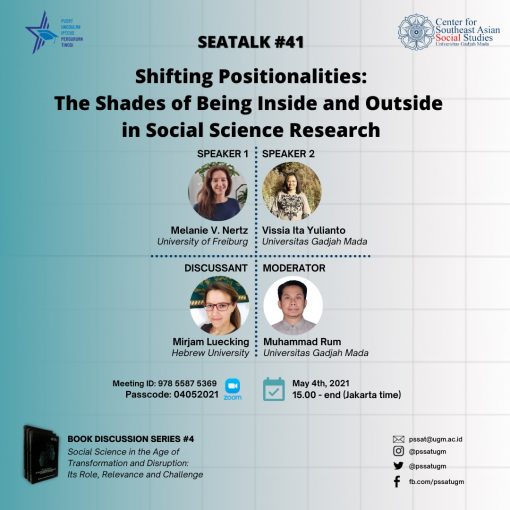
[SEA-TALK #41] Book Discussion Series #5 on “Social Science in the Age of Transformation and Disruption: Its Relevance, Role and Challenge”
“Social science research is hardly objective in studying the knowing subject and has always been subjective in some respects”, said Melanie V. Nerzt and Vissia Ita Yulianto, authors of a book chapter “Shifting Positionalities: The Shades of being inside and outside in Social Science Research” (2020).
Drawing mostly on experiences in conducting anthropological tandem fieldwork as an Indonesian and a German researcher on the islands of Sulawesi and Java, Indonesia, in the course of 2010 and 2011, Melanie and Ita sets out the roles they took and were ascribed in various contexts of the field and explores the implications of being an insider and an outsider researcher.
They argued that firstly, research positionality depends on the researcher´s disciplinary, socio-cultural and professional background, personality and personal interests as well as on attributes attached to gender, race, social class, nationality, ethnicity, age, religion, ideology and political affiliation. Secondly, research positionality affects data collection and interpretation, hence the production of knowledge. According to both presenters, reflecting on positionality is crucial to detect biases on part of the researcher as well as to understand researcher/participant dynamics.
Acting as the discussant is a German anthropologist based in Hebrew University, Mirjam Lücking. Having rich experience in conducting fieldwork and write about Indonesia, Mirjam adds that positionality has always been in intersectionality. On her presentation, she triggered further question if positionality also matters on the desk when researchers analyse their data from the fieldwork.
The discussion was lively and fruitful, officially opened by director of Cesass (Center for Southeast Asian Social Studies), Prof. Dr. Hermin Indah Wahyuni, and moderated by Dr. Muhammad Rum, an IR scientist from Universitas Gadjah Mada.
To watch further details, see the video: [SEA TALK #41] Discussion #5 on “Social Science in the Age of Transformation and Disruption” – YouTube
To be noted the two presenters and the discussant above are graduates from University of Freiburg, Germany who employ tandem research design developed by Judith Schlehe who sees that cultural differences can be used in a productive and synergizing way as people can learn from each other and more perspectives always complete the picture (2008: 19).
About the presenters:
Melanie V Nerzt is a PhD candidate in the Dept. of Socio-cultural anthropology, University of Freiburg. holds a Masters in Social and cultural anthropology and Islamic Studies. Publications include: Nertz, Melanie V. (2014): ‘Muslim modernities’ in Makassar and Yogyakarta: negotiating ‘the West’ as a frame of reference. In: Volker Gottowik (ed.): Dynamics of religion in Southeast Asia: magic and modernity. Amsterdam: Amsterdam Univ. Press, pp. 155-174, and Schlehe, Judith /Melanie V. Nertz / Vissia Ita Yulianto (2013): Re-imagining the `West´ and performing`Indonesian modernities´: Muslims, Christians and paranormal practitioners. In: Zeitschrift für Ethnologie, Vol. 138, No. 1, pp. 3-21.
Vissia Ita Yulianto is an Indonesian socio-cultural anthropologist. She is the author of the book “Reframing Modernities in Contemporary Indonesia: An Ethnographic Study of Ideas of Center and Periphery on Sulawesi and Java”, Regiopectra, Berlin (2015). Her areas of expertise are post-coloniality, cultural studies, memory studies, and Southeast Asian Studies. She is a researcher at the Center for Southeast Asian Social Studies and lecturer at the master program of Performing and Visual Art Studies, Universitas Gadjah Mada. Latest publications include: Schlehe, J., & Yulianto, V. I. (2020). An anthropology of waste: Morality and social mobilisation in Java. Indonesia and the Malay World, 48(140), 40-59, Deng, J. B., Wahyuni, H. I., & Yulianto, V. I. (2020). Labor migration from Southeast Asia to Taiwan: issues, public responses and future development. Asian Education and Development Studies, and Parahita, G. D., & Yulianto, V. I. (2020). The Treachery on YouTube: The Politics of Memory on New Media in Indonesia. Archipel. Études interdisciplinaires sur le monde insulindien, (99), PP. 47-73.
Google Scholar:
https://scholar.google.co.id/citations?user=VJub5-cAAAAJ&hl=en
Mirjam Lücking is a postdoctoral fellow at the Hebrew University of Jerusalem, first in affiliation with the Department of Asian Studies and the I-CORE Center for the Study of Conversion and Inter-religious Encounters at Ben-Gurion University of the Negev (2017–2019) and currently as a member of the Martin Buber Society of Fellows in the Humanities and Social Sciences. Previously she worked as a researcher and lecturer in the Department of Social and Cultural Anthropology at the University of Freiburg, Germany, where she completed her PhD. She studied and conducted anthropological research in Freiburg, Germany; Damascus, Syria; Fès, Morocco; and Madura, Samarinda, Jakarta, and Yogyakarta, Indonesia.
Her work on labor migration, pilgrimage and tourism, religious identities in Indonesia and transregional connections between Indonesia and the Arab World has been published in international peer-reviewed journals such as the European Journal of East Asian Studies, Social Sciences, and Bijdragen, and in her book, Indonesians and Their Arab World: Guided Mobility among Labor Migrants and Mecca Pilgrims (Cornell University Press).
Google Scholar:
https://scholar.google.co.id/citations?user=ugKUCKMAAAAJ&hl=id
[embedyt] https://www.youtube.com/watch?v=Pt5kwiW3jIw[/embedyt]
To purchase the book please click:
Domestic order:
https://bit.ly/socialsciencebookCESASS or http://www.tokopedia.com/cesassugm
International order:
http://bit.ly/bookorderforinternational
CP: (+62) 857-8655-1075 (Nur’aini)
